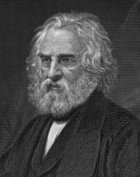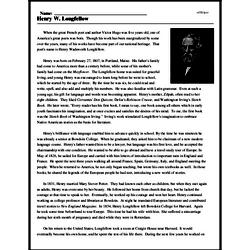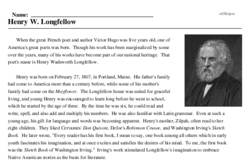Henry W. Longfellow
Henry W. Longfellow
Reading Comprehension for February 27
When the great French poet and author Victor Hugo was five years old, one of America's great poets was born. Though his work has been marginalized by some over the years, many of his works have become part of our national heritage. That poet's name is Henry Wadsworth Longfellow.
Henry was born on February 27, 1807, in Portland, Maine. His father's family had come to America more than a century before, while some of his mother's family had come on the Mayflower. The Longfellow home was suited for graceful living, and young Henry was encouraged to learn long before he went to school, which he started by the age of three. By the time he was six, he could read and write, spell, and also add and multiply his numbers. He was also familiar with Latin grammar. Even at such a young age, his gift for language and words was becoming apparent. Henry's mother, Zilpah, often read to her eight children. They liked Cervantes' Don Quixote, Defoe's Robinson Crusoe, and Washington Irving's Sketch Book. He later wrote, "Every reader has his first book, I mean to say, one book among all others which in early youth fascinates his imagination, and at once excites and satisfies the desires of his mind. To me, the first book was the Sketch Book of Washington Irving." Irving's work stimulated Longfellow's imagination to embrace Native American stories as the basis for literature.
Henry's brilliance with language enabled him to advance quickly in school. By the time he was nineteen he was already a senior at Bowdoin College. When he graduated, they asked him to be chairman of a new modern language course. Henry's father wanted him to be a lawyer, but language was his first love, and he accepted the chairmanship with one condition. He wanted to be able to go abroad and have a travel study tour of Europe. In May of 1826, he sailed for Europe and carried with him letters of introduction to important men in England and France. He spent the next three years walking all around France, Spain, Germany, Italy, and England meeting the people. When he returned to America, he not only began teaching, but wrote his own textbooks as well. In those books, he shared the legends of the European people he had met, introducing a new world of stories.




